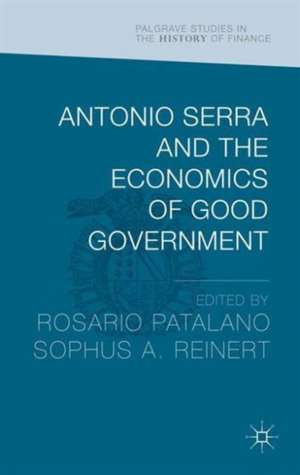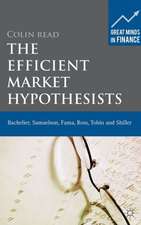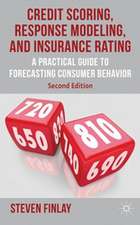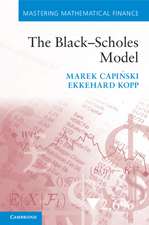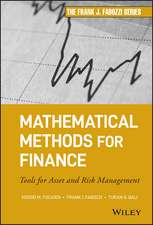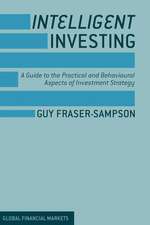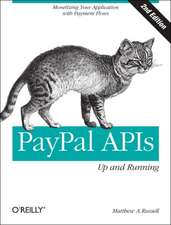Antonio Serra and the Economics of Good Government: Palgrave Studies in the History of Finance
Editat de Sophus Reinert, Rosario Patalanoen Limba Engleză Hardback – 25 apr 2016
Din seria Palgrave Studies in the History of Finance
-
 Preț: 362.11 lei
Preț: 362.11 lei - 9%
 Preț: 764.94 lei
Preț: 764.94 lei - 9%
 Preț: 626.30 lei
Preț: 626.30 lei - 18%
 Preț: 737.26 lei
Preț: 737.26 lei - 15%
 Preț: 522.89 lei
Preț: 522.89 lei -
 Preț: 451.65 lei
Preț: 451.65 lei - 15%
 Preț: 701.06 lei
Preț: 701.06 lei - 18%
 Preț: 726.37 lei
Preț: 726.37 lei - 15%
 Preț: 712.22 lei
Preț: 712.22 lei - 15%
 Preț: 530.25 lei
Preț: 530.25 lei - 18%
 Preț: 1114.21 lei
Preț: 1114.21 lei - 18%
 Preț: 1006.55 lei
Preț: 1006.55 lei - 18%
 Preț: 726.06 lei
Preț: 726.06 lei - 18%
 Preț: 786.84 lei
Preț: 786.84 lei - 18%
 Preț: 792.03 lei
Preț: 792.03 lei - 18%
 Preț: 724.94 lei
Preț: 724.94 lei - 15%
 Preț: 702.54 lei
Preț: 702.54 lei - 18%
 Preț: 723.69 lei
Preț: 723.69 lei -
 Preț: 388.72 lei
Preț: 388.72 lei - 15%
 Preț: 694.19 lei
Preț: 694.19 lei - 18%
 Preț: 782.72 lei
Preț: 782.72 lei - 15%
 Preț: 637.59 lei
Preț: 637.59 lei - 18%
 Preț: 1108.51 lei
Preț: 1108.51 lei - 9%
 Preț: 920.31 lei
Preț: 920.31 lei - 15%
 Preț: 711.89 lei
Preț: 711.89 lei -
 Preț: 383.12 lei
Preț: 383.12 lei - 18%
 Preț: 891.33 lei
Preț: 891.33 lei - 18%
 Preț: 958.25 lei
Preț: 958.25 lei - 18%
 Preț: 1008.28 lei
Preț: 1008.28 lei -
 Preț: 445.88 lei
Preț: 445.88 lei - 18%
 Preț: 1113.58 lei
Preț: 1113.58 lei - 15%
 Preț: 702.05 lei
Preț: 702.05 lei -
 Preț: 450.11 lei
Preț: 450.11 lei - 18%
 Preț: 794.39 lei
Preț: 794.39 lei - 18%
 Preț: 948.29 lei
Preț: 948.29 lei - 15%
 Preț: 697.97 lei
Preț: 697.97 lei - 18%
 Preț: 728.74 lei
Preț: 728.74 lei
Preț: 646.75 lei
Preț vechi: 760.88 lei
-15% Nou
Puncte Express: 970
Preț estimativ în valută:
123.75€ • 129.22$ • 102.19£
123.75€ • 129.22$ • 102.19£
Carte tipărită la comandă
Livrare economică 15-29 aprilie
Preluare comenzi: 021 569.72.76
Specificații
ISBN-13: 9781137539953
ISBN-10: 113753995X
Pagini: 352
Ilustrații: IX, 374 p.
Dimensiuni: 140 x 216 x 22 mm
Greutate: 0.59 kg
Ediția:1st ed. 2016
Editura: Palgrave Macmillan UK
Colecția Palgrave Macmillan
Seria Palgrave Studies in the History of Finance
Locul publicării:London, United Kingdom
ISBN-10: 113753995X
Pagini: 352
Ilustrații: IX, 374 p.
Dimensiuni: 140 x 216 x 22 mm
Greutate: 0.59 kg
Ediția:1st ed. 2016
Editura: Palgrave Macmillan UK
Colecția Palgrave Macmillan
Seria Palgrave Studies in the History of Finance
Locul publicării:London, United Kingdom
Cuprins
Introduction: Rosario Patalano and Sophus A. Reinert
1. The Place of Naples in the Seventeenth-century Spanish Empire: Gabriel Paquette
2. The Vicaria Prison of Naples in the time of Antonio Serra: Francesca De Rosa
3. The Cost of Empires: Antonio Serra and the Debate on the Causes and Solutions of Economic Crises in the Viceroyalty of Naples in the Seventeenth Century: Giovanni Zanalda
4. Serra's Brief Treatise in a World-System Perspective: The Dutch Miracle and Italian Decadence in the Early 17th Century: Rosario Patalano
5. The Influence of Portuguese Economic Thought on the Breve trattato:
Antonio Serra and Miguel Vaaz in Spanish Naples: Gaetano Sabatini
6. Authority and Expertise at the Origins of Macroeconomics: Sophus A. Reinert
7. The Republic of Liberties and Wealth: The Politics of Antonio Serra: Luca Addante
8. External imbalances and the money supply: Two controversies in the English 'Realme' and in the Kingdom of Naples: Lilia Costabile
9. Real and Monetary Factors in the de Santis-Serra Controversy: André Tiran
10. Serra and underdevelopment: Cosimo Perrotta
11. 'To console and alleviate the human mind': Ferdinando Galiani's attempted re-publication of Serra in the 1750s: Koen Stapelbroek
12. Francesco Saverio Salfi and the eulogy for Antonio Serra: Politics, Freemasonry and the consumption of Culture in the Early Nineteenth Century: Antonio Trampus
13. Serra's Discovery and Ill Fate in the Liberal Nineteenth Century:Francesco di Battista
14. The Heritage of Antonio Serra: Alessandro Roncaglia
15. Serra's Breve Trattato and the Financial and Monetary Aspects of Economic Development: Jan Kregel
16. Antonio Serra and the Problems of Today: Erik S. Reinert
Index
1. The Place of Naples in the Seventeenth-century Spanish Empire: Gabriel Paquette
2. The Vicaria Prison of Naples in the time of Antonio Serra: Francesca De Rosa
3. The Cost of Empires: Antonio Serra and the Debate on the Causes and Solutions of Economic Crises in the Viceroyalty of Naples in the Seventeenth Century: Giovanni Zanalda
4. Serra's Brief Treatise in a World-System Perspective: The Dutch Miracle and Italian Decadence in the Early 17th Century: Rosario Patalano
5. The Influence of Portuguese Economic Thought on the Breve trattato:
Antonio Serra and Miguel Vaaz in Spanish Naples: Gaetano Sabatini
6. Authority and Expertise at the Origins of Macroeconomics: Sophus A. Reinert
7. The Republic of Liberties and Wealth: The Politics of Antonio Serra: Luca Addante
8. External imbalances and the money supply: Two controversies in the English 'Realme' and in the Kingdom of Naples: Lilia Costabile
9. Real and Monetary Factors in the de Santis-Serra Controversy: André Tiran
10. Serra and underdevelopment: Cosimo Perrotta
11. 'To console and alleviate the human mind': Ferdinando Galiani's attempted re-publication of Serra in the 1750s: Koen Stapelbroek
12. Francesco Saverio Salfi and the eulogy for Antonio Serra: Politics, Freemasonry and the consumption of Culture in the Early Nineteenth Century: Antonio Trampus
13. Serra's Discovery and Ill Fate in the Liberal Nineteenth Century:Francesco di Battista
14. The Heritage of Antonio Serra: Alessandro Roncaglia
15. Serra's Breve Trattato and the Financial and Monetary Aspects of Economic Development: Jan Kregel
16. Antonio Serra and the Problems of Today: Erik S. Reinert
Index
Notă biografică
Rosario Patalano is Professor of the History of Economic Thought at the University of Naples 'Federico II'.
Sophus A. Reinert is Assistant Professor of Business Administration in the Business, Government, and the International Economy Unit at Harvard Business School.
Sophus A. Reinert is Assistant Professor of Business Administration in the Business, Government, and the International Economy Unit at Harvard Business School.
Textul de pe ultima copertă
Little is known of Antonio Serra except that he wrote his extraordinary 1613 Short Treatise on the Causes that Make Kingdoms Abound in Gold and Silver even in the Absence of Mines in a Neapolitan jail, and that he died there soon afterwards. However the contribution this work made represents a watershed not only in the discipline of economics but in the history of social science and intellectual history more generally.
In this book some of the world's leading economists and experts on Serra explore the enduring appeal of Breve trattato. The authors analyse the work in its historical, economic, cultural and intellectual contexts, exploring the finer details of his theory regarding international financial interactions and his indebtedness to Renaissance legal traditions. The book also uncovers new material relating to Serra's life and provides in-depth interpretation of his key insights, influences and political economy.
This book highlights the parallels between issues discussed by Serra and modern political and scholarly consciousness, and illustrates the importance and influences of historical debate in modern economic thinking.
In this book some of the world's leading economists and experts on Serra explore the enduring appeal of Breve trattato. The authors analyse the work in its historical, economic, cultural and intellectual contexts, exploring the finer details of his theory regarding international financial interactions and his indebtedness to Renaissance legal traditions. The book also uncovers new material relating to Serra's life and provides in-depth interpretation of his key insights, influences and political economy.
This book highlights the parallels between issues discussed by Serra and modern political and scholarly consciousness, and illustrates the importance and influences of historical debate in modern economic thinking.
